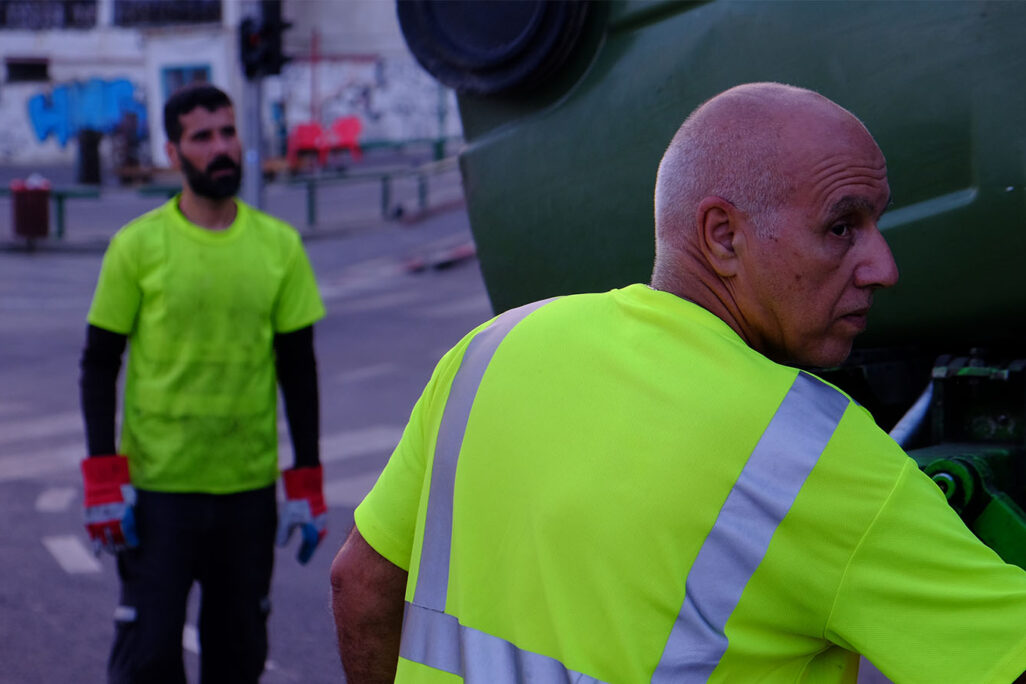
Amnon Sombol was 29 years old when he first took on a job at the Tel Aviv Sanitation Department as a waste collector. 28 years later, Sombol, who still works daily shifts on the garbage truck, insists he wouldn't have traded his job for any other.
"Sanitation is the best department to work for in the municipality. In the past, people used to be embarrassed to work in sanitation, but today, waste collecting is a job to be proud of," he says.
It's a phrase you don't usually expect to hear from sanitation workers, but in Tel Aviv's sanitation department, most workers would easily agree. It's not that the job is in any way easy: workers deal with what most of us try desperately to stay away from – our waste. They work long hours dragging and shifting trash cans onto garbage trucks. Even so, work at the sanitation department is in demand, with some workers even leaving other jobs for a position as trash collectors. They are proud of their work and wish for their children to also work in this field. Years of strong labor union activism has helped turn Tel Aviv's sanitation department into a surprisingly attractive workplace, with better and more stable working conditions than many others in Israel.
How did standing on a garbage truck become a sought-after job? We joined the workers for a shift to find out.
The cleanest cabin
The time: 3:30 in the morning. At the Tel Kabir Logistical Center, the garbage truck drivers are assembling to sign in and take out trucks to start their shift. There I met Amnon Sombol, who is responsible for hauling about eight tons of garbage each night.
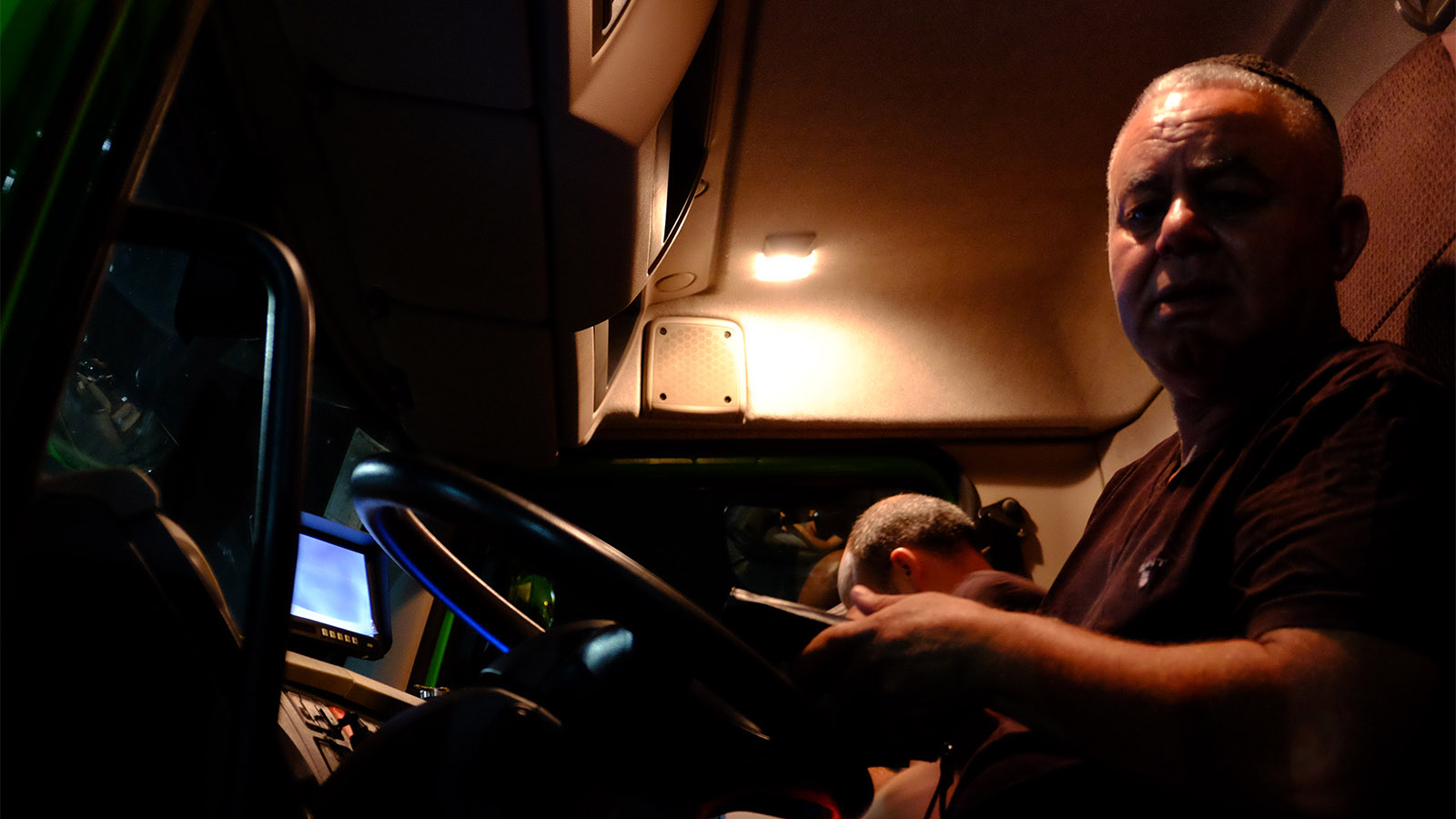
Sombol, 57, is married with three kids, lives in Or Yehuda and is originally from Tel Aviv. His parents immigrated to Israel from Iraq, and he has been working in the Tel Aviv Sanitation Department for 28 years. At first he worked on the back of a pick-up truck, and was then promoted to truck driver. He’s been on the truck for over 20 years. When I climb into the truck’s cabin with Sombol he makes a point of showing me the level of tidiness he maintains.
“You didn't think it would be as clean as this in a garbage truck, did you?" he says proudly. Sombol never leaves his shift without cleaning the vehicle and claims that other drivers won't drive his truck because of his high cleanliness standards.
Every night, Tel Aviv’s sanitation workers dispose of some 1,200 tons of garbage. On holidays, it can even reach 1,600 tons. Despite the image many of us have of a mechanized process of emptying the plastic garbage cans into the truck, people actually drag the garbage cans from their holding places and connect them to the truck which raises them in the air and empties their contents into the truck. Each truck routinely hauls some eight tons of garbage each night, and the shift workers carry this weight with their hands and bodies. Alongside the physical challenge of the weight, the workers also walk for long periods next to the truck – according to a step-tracking app, about 9 to 12 kilometers a night.
A day in a sanitary worker's life
“You get used to waking up early. I get up for work at 3:00 a.m. By 3:30, I'm in the truck already. At 8:30 a.m., I finish working after emptying the truck and cleaning it. I don’t leave the vehicle until it’s clean and shiny. I go home or hang around for a bit with the guys at the station, and then I take a nap from 11 a.m. to 4 or 5 p.m. I try to go to bed no later than half past midnight,” he explains.
“My job is not boring," says Sombol. "I don’t fall asleep, despite the hours. The work is hard and I get up early. I work reasonable hours. Sanitation is the best department to work for in the municipality. In the past, people used to be embarrassed to work in sanitation, but today, waste collecting is a job to be proud of. You don’t have to be embarrassed about it.”
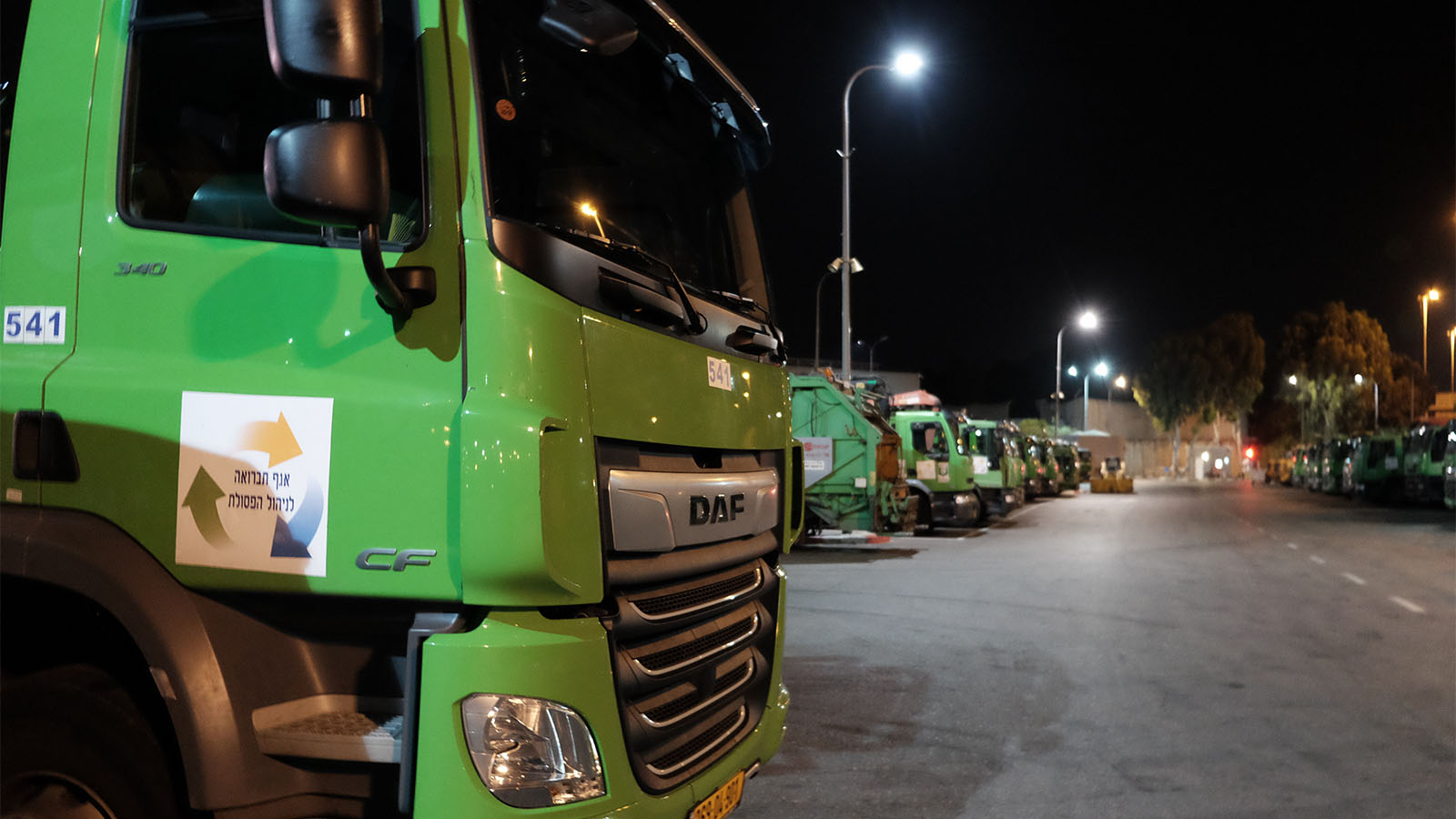
When I asked Sombol if he would like his son to join him in his work place he surprised me. “Today, I would want my son to work in sanitation. If only he could get in. You see, in the past, the job was passed down from father to son, today it’s not like that. There’s nothing better than my conditions working for the city council. Sanitation has the best conditions,” he says.
“The workers’ committee looks out for people. It started with Arnon Bar David, who's now head of the Histadrut. He was chairman of the workers' committee, and there's never been anyone better. He deserved to be promoted and elected the chair of the Histadrut," Sombol says.
"The workers' committee helps facilitate work smoothly. I get paid on time and there are never any problems. We do our best. Whatever needs to be done, we work around the clock. We haven’t had to go on strike for 20 years, and a lot of that has to do with the way the committee has been working to reach agreements with the council. They've got our backs.”
If you don’t see your job as your mission, it’s a problem
Around 4 a.m, the sanitation workers gather at the Carmel Regional Station. Avi Wahba, the deputy station manager, greets me and explains about the set up. The station has about 40 workers: the workers who prepare the garbage cans to be collected, the truck teams, the workers who put the cans back, management staff, inspectors, a recycling coordinator, and the recycling collection team.
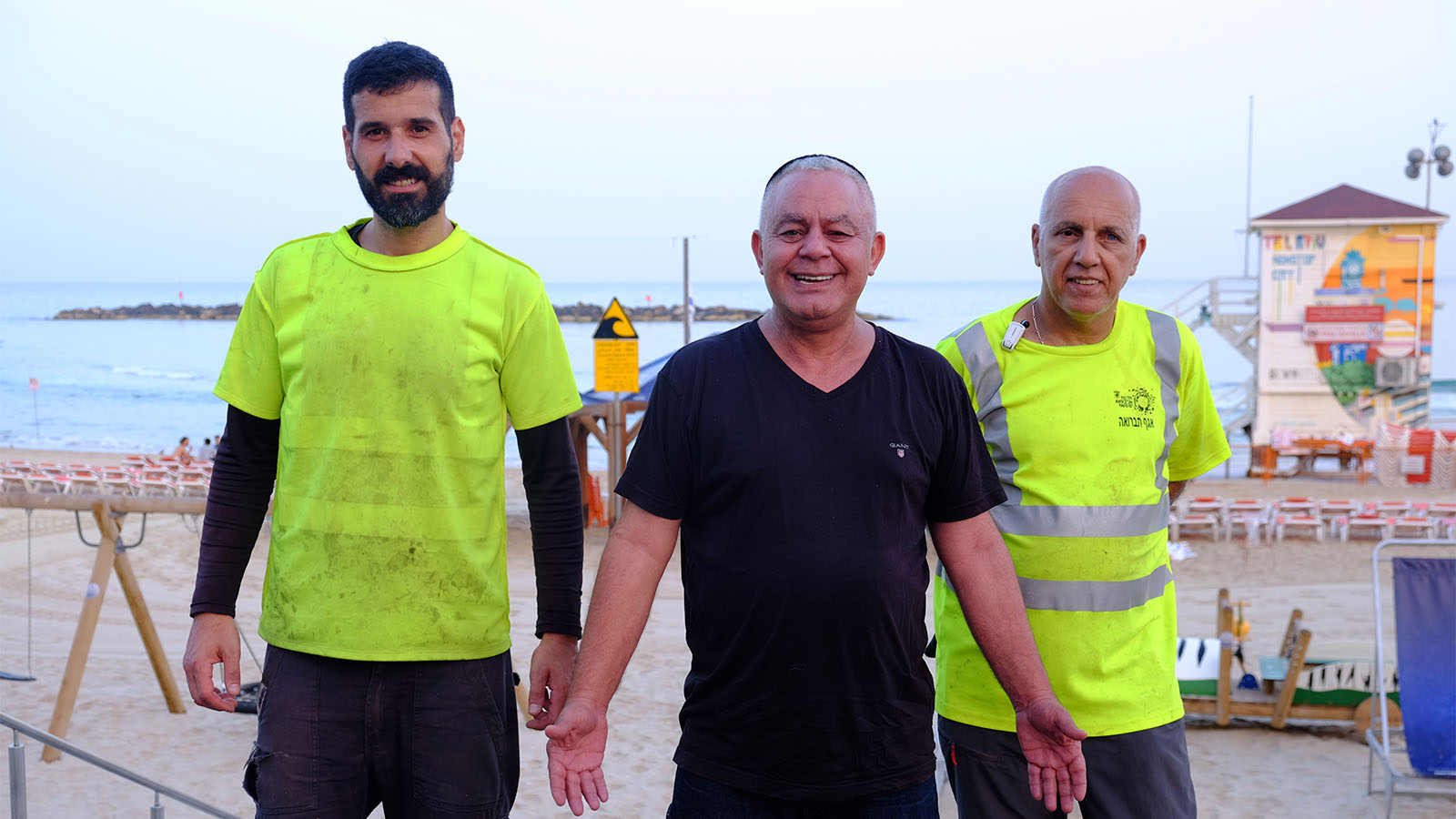
Half an hour into the shift I join Doron and Shalev, two other waste collectors, who are loading the garbage cans.
“You can’t forget, we are also representatives of the municipality. Residents see us that way because of the service we provide. If you don’t see the work as your mission, that’s a problem. It’s a matter of character,” says Barzelai while working.
Barzelai , who in his personal life is an activist and volunteer in his neighborhood, sees a connection between his work collecting garbage and his work as a neighborhood activist, saying, “I do everything on a voluntary basis. People whose lives are based on caring for society have satisfaction. When my area is clean I am satisfied.”
Barzelai describes the work as “physical and exhausting".
"We have a problem that the body gets used to waking up early, because we don’t sleep at night. Even during vacations we wake up at the same time. Your biological clock wakes you up,” he says.
He thinks it's good for his health though.
“In this job I run throughout the entire shift. I'm constantly moving my body. Every day, eight to nine kilometers.”
Shalev, a relatively young worker in the Sanitation Department, started as a city inspector. After a few years, he had the opportunity to switch to a different department and found himself in sanitation. “This is what I wanted and I like it. For me, hard work is a kind of way to release tension,” he tells me.
When asked about being bothered by the working conditions, the dirtiness and the difficult hours, Shalev answers confidently:“Between you and me, who wants to be an inspector? I’m a night person. I love these hours. As a teenager, I worked at the wholesale market in Tel Aviv, in fruits and vegetables. I was thrown into the deep end at a young age.”
Three months ago, Shalev moved to Ashdod with his family, where they rent a house near his wife’s family. Since then, he takes the train to work every day, and on the last kilometer he uses his scooter. On the night we met, Shalev was substituting for a regular team member on the line.
“I’m looking forward to start working on a permanent line,” says Shalev, who is waiting for his time to be promoted.“It’s a matter of seniority,” he adds.
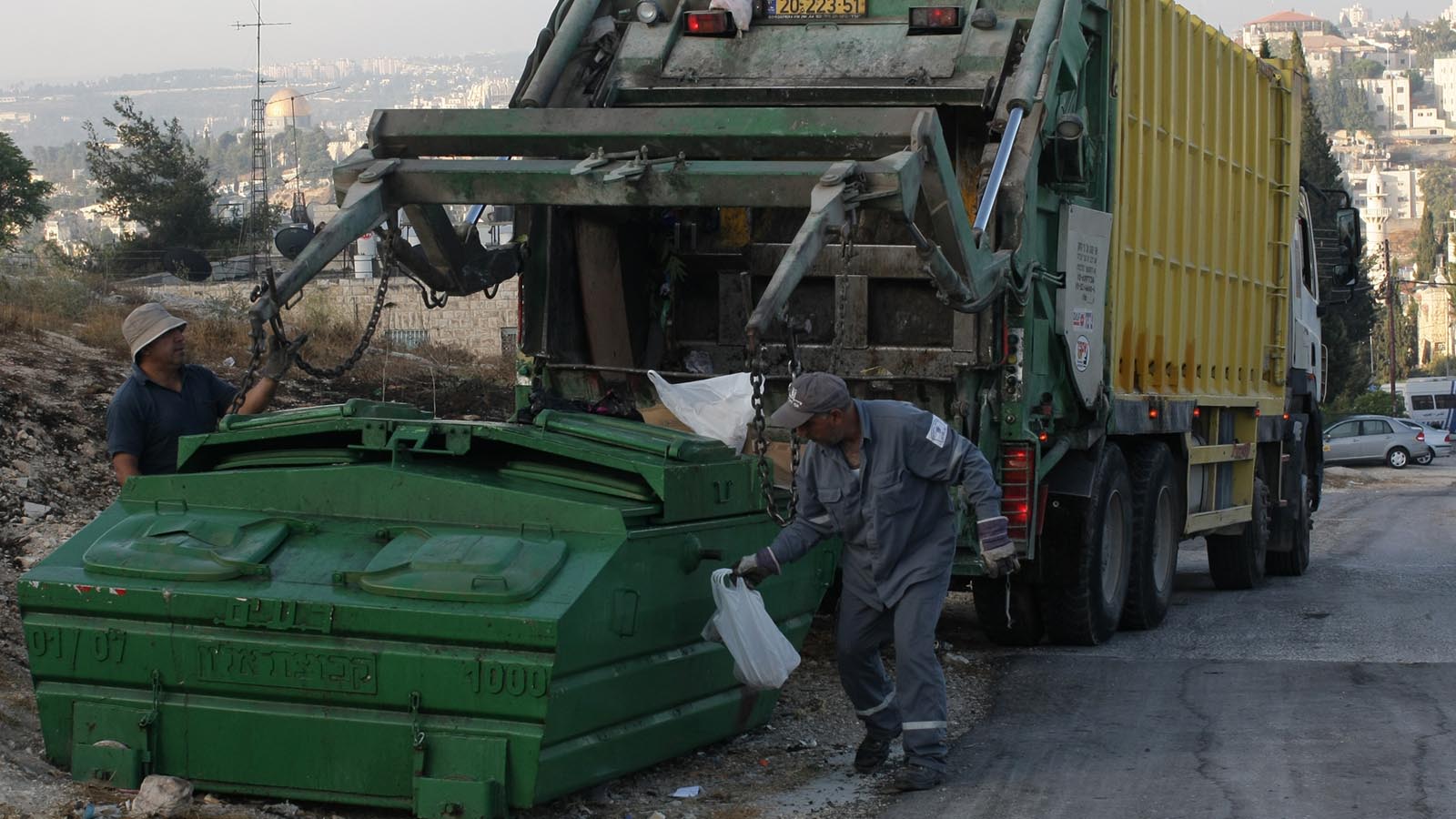
A paper-pushing job
The paper collection truck team – Tzadok Mizrahi driving, with Yossi Shviro and Guy Avar in the back – pick me up at the entrance to the Tel Baruch neighborhood for a round of collecting blue trash cans. Mizrahi, the driver, age 41, is originally from Tel Aviv but has been living for the past two years in Holon. Three years ago he left his job as an independent truck driver and wood and metal fixtures salesman in order to get into the Sanitation Department.
“My father was a Sanitation Department driver for 40 years and I had the option as a second generation,” says Mizrahi, who was one of the last to have this option. “This is a good and well-organized job. I gave up a higher salary because of the conditions – full vehicle maintenance, work clothing, hours, pension, health and dental insurance for the entire family. You work for a large and good organization. The workers’ committee’s presence is felt, that if you need something, there is someone to turn to with any problem you have. The organization is big, it helps, and supports in most cases.”
Mizrahi adds, “I love the work. It’s satisfying in terms of the help and cleanliness for the residents. Most of the time people are appreciative.”
A big difference between recycling collection and the regular garbage collection is that every day, the collection route is different. Mizrahi is responsible for collection in the entire northern part of the city, a daily average of five to six tons of paper.
Yossi Shviro, 43, has worked for the city for 22 years – including four years in recycling and three months in paper.
“I was born in Or Yehuda and I still live there. I started working in this job through a human resourcesagency, and after four years I got tenure in 1994. I love everything about this job – we laugh, we work together, we come to work happy. You feel you have friends at work. Sanitation is the best way to make a living. I’m happy, what more could I ask for?” he says.
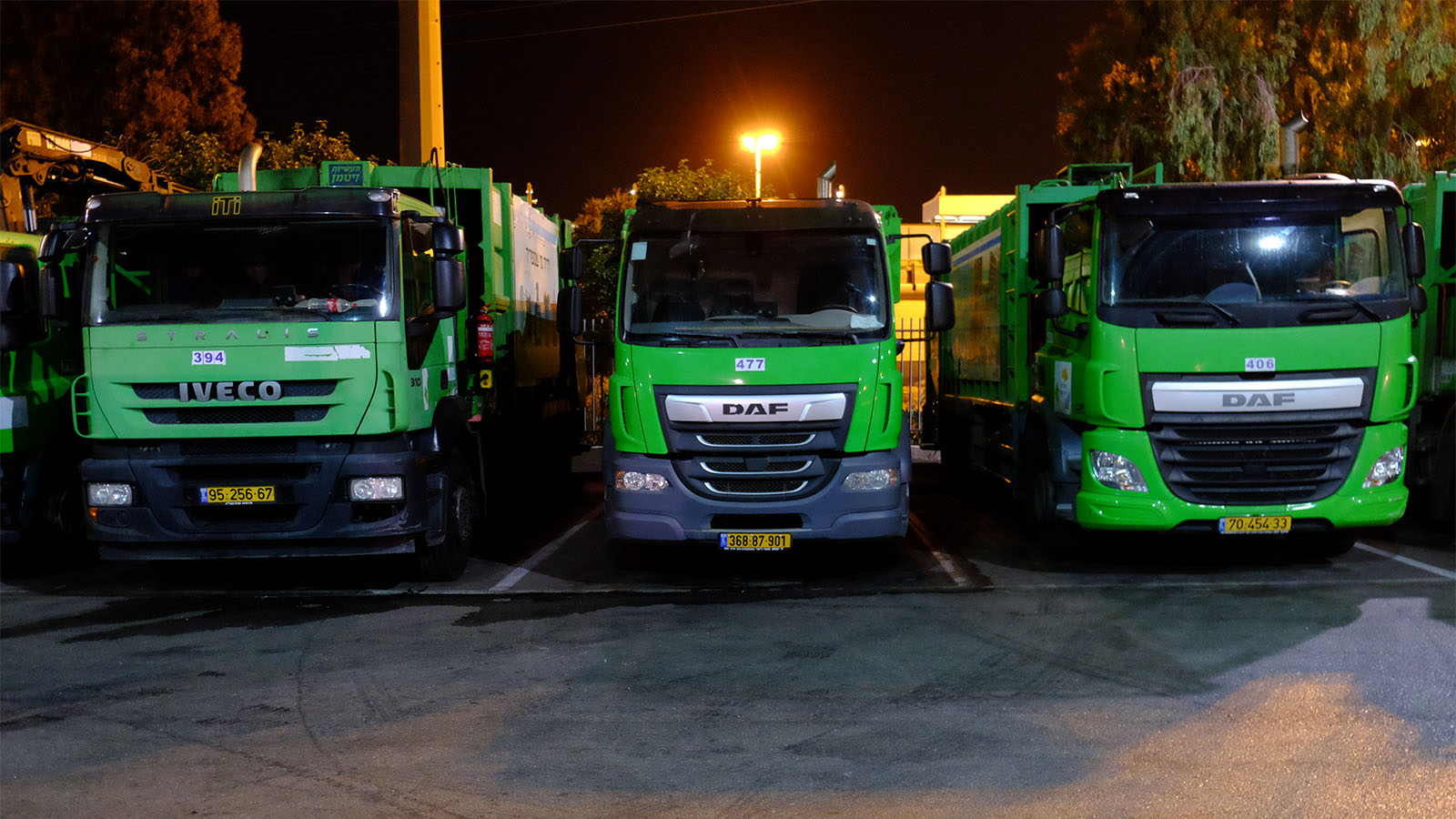
Equals
“The municipality and the union today see the worker eye to eye,” Shalom Ben David, vice chair of the union and deputy director of the Sanitation Department, tells me. Ben David, 54, has worked for the city for 31 years, and he is especially familiar with the sanitation field.
“We collect 1,100 to 1,200 tons of trash on a regular day. On holidays, it can reach 1,400 to 1,600 tons. 950 workers including drivers, managers, and workers. All of the trash collection in Tel Aviv, including all of the streets, hospitals, IDF camps, hotels, recycling, yard waste, and separating different kinds of trash,” he explains.
Ben David tries to explain why the workers are so happy with their jobs.
“We provide a lot of courses and training sessions, develop the workers, empower them. We run bonding days. We encourage them to go out and finish their studies. We also encourage the ones who don’t have education to complete their degree and afterwards they can get benefits," he says. "There is a wide variety of courses, including media and computer skills. Our workers are treated as equals.”






